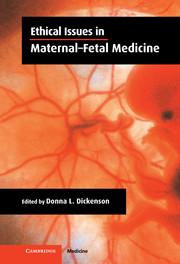Book contents
- Frontmatter
- Contents
- List of contributors
- Acknowledgements
- 1 Introduction: recent debates in maternal–fetal medicine – what are the ethical questions?
- 2 Overview: a framework for reproductive ethics
- I GENERIC ISSUES IN PREGNANCY
- II INCEPTION OF PREGNANCY: NEW REPRODUCTIVE TECHNOLOGIES
- III FIRST AND SECOND TRIMESTER
- 12 Ethical and social aspects of evaluating fetal screening
- 13 Prenatal counselling and images of disability
- 14 Models of motherhood in the abortion debate: self-sacrifice versus self-defence
- 15 Who owns embryonic and fetal tissue?
- 16 The fewer the better? Ethical issues in multiple gestation
- IV THIRD TRIMESTER
- V NEONATAL LIFE
- Index
12 - Ethical and social aspects of evaluating fetal screening
from III - FIRST AND SECOND TRIMESTER
Published online by Cambridge University Press: 29 September 2009
- Frontmatter
- Contents
- List of contributors
- Acknowledgements
- 1 Introduction: recent debates in maternal–fetal medicine – what are the ethical questions?
- 2 Overview: a framework for reproductive ethics
- I GENERIC ISSUES IN PREGNANCY
- II INCEPTION OF PREGNANCY: NEW REPRODUCTIVE TECHNOLOGIES
- III FIRST AND SECOND TRIMESTER
- 12 Ethical and social aspects of evaluating fetal screening
- 13 Prenatal counselling and images of disability
- 14 Models of motherhood in the abortion debate: self-sacrifice versus self-defence
- 15 Who owns embryonic and fetal tissue?
- 16 The fewer the better? Ethical issues in multiple gestation
- IV THIRD TRIMESTER
- V NEONATAL LIFE
- Index
Summary
Introduction
A current doctrine in medicine is that health care should be evidence-based, and an important tool of evidence-based medicine is health technology assessment (HTA). A typical textbook definition of HTA is that it includes studying the health, economic, social and ethical consequences of a health technology in a way that helps in deciding on its use. Health aspects include intended consequences, efficacy and effectiveness, as well as unintended consequences, adverse effects and side effects. Some commentators would also include in HTA the study of factors that influence the use of a health technology.
Specific to HTA is its aim of integrating knowledge of different aspects of a technology, in order to provide a full evaluation to help decision-makers. In practice, however, ethical and social aspects, if studied at all, have not been integrated into the HTA process. One reason for this is the difficulty of combining ethical and social aspects with other outcomes. To aggregate various factors in health, several methods have been created, including quality-adjusted life-years. To combine health and cost data, cost-effectiveness, cost benefit and other such methods have been developed. But there is no quantitative method by which to measure ethical and social consequences. Thus, they are treated as separate issues, and often added as a footnote or afterthought when an evaluation of a health technology has already been made.
The purpose of this chapter is to illustrate the importance of the integration of ethical and social consequences in HTA, using fetal screening as an example.
- Type
- Chapter
- Information
- Ethical Issues in Maternal-Fetal Medicine , pp. 183 - 194Publisher: Cambridge University PressPrint publication year: 2002



